No matter how far technology has come with regard to earthquake predictions and detection, Mother Nature is still unpredictable. When she decides to display her power, all you will have is your knowledge and level of preparedness. At the end of the day how you behave will determine your chances of surviving after an earthquake. It is therefore imperative that you learn how to survive an earthquake.
[the_ad_placement id=”in-text-1-type-r”]You need to learn how to survive any earthquake by implementing information applicable to the before, during, and after the event.
What to do before an earthquake?
Preparing beforehand for an earthquake is something that will enhance your chances of survival. This is especially true if you live in earthquake-prone regions but since earthquakes can’t be predicted in time, everyone should know more about disaster preparedness – you can read more about it in this article.
Selecting a residential or work building
If you intend to live in an earthquake prone region, you need to find a residence that is build up to current standards of safety. Modern methods of construction have made it possible for some buildings to withstand the movement of the earth’s tectonic plates with minimal damage. The foundations of such buildings are mead in such a way that the buildings rolls with the movement of the earth. Your chances of earthquake survival in such a building will be much higher as a result.
If you happen to visit a country whose building standards are not as high as those of the US are or countries like Japan, your approach will need to be a bit different. Your task would be to try to identify a place to stay that has been built with high quality materials and looks steady. In such areas, look for buildings which have withstood multiple earthquakes with minimal damage.
Securing internal objects
If your place of residence is one that experiences earth movements on a regular basis, take time to identify potential hazards that may become deadly falling objects or projectiles.
Ensure that you incorporate secured cabinets and furniture in which to store those objects. The last thing you want is to have to deal with things like flying knives when you are very unstable on your feet.
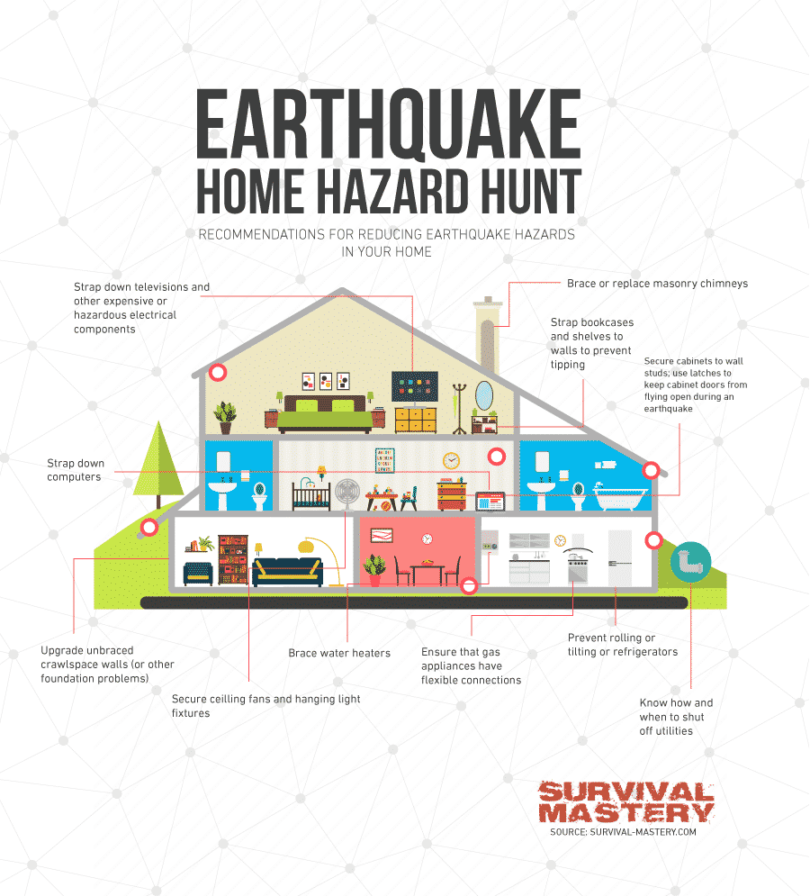
Creating a disaster management plan
No one can really predict accurately when an earthquake is going to occur or how bad it is going to be. As such, it is important for you to create a disaster-management plan with your loved ones. All of you should become very familiar with the plan.
Issues like communication, potential hiding places, and evacuation plans need to be discussed beforehand. That way, everyone is less likely to panic when the earthquake actually happens.
Storing important documents
You must identify all your important documents like insurance and financial documents and wills beforehand. These documents should be stored in fireproof safes. It will make it easier for you to pick up the pieces after the earthquake causes damage.
Accumulating emergency supplies
When earthquakes happen, no matter how prepared people think they are chaos always ensues. Getting help or basic supplies in those first few days after that earthquake may prove difficult. This can be very dangerous especially if you or your loved ones have been injured or are ill.
You need to gather emergency supplies like emergency food, water, first aid kits, blankets, and medicine that you may need after the earthquake. You should then store several of these supplies in different areas of your home, office, and even car for easy access when the need arises. It is always better to be safe than sorry! Read more about putting together an earthquake emergency kit.
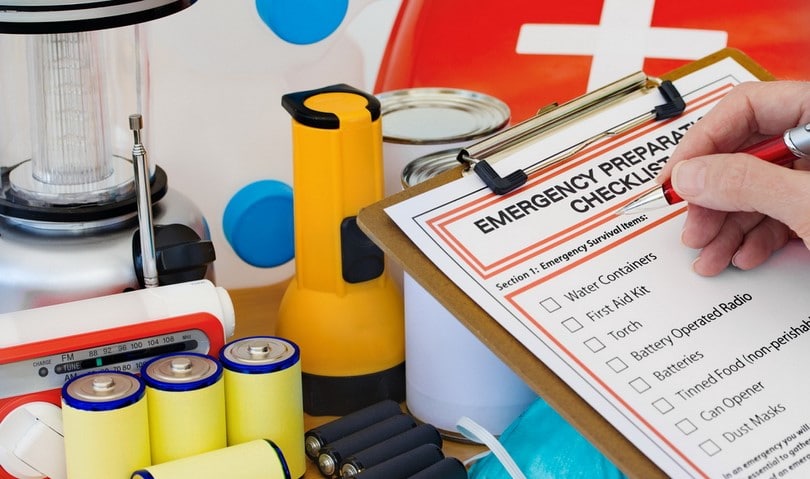
Switching off power and gas connections
If you have a few minutes of warning before the earthquake, try to switch off any power and gas connections. By doing so, you may end up saving your home from any possible explosions or fires that would have erupted if a flame ignited.
You may want to consider placing all your fuel containment units away from ignition sources. This move however, is of lower priority than running to safe positions.
What to do during an earthquake?
All the preparation you make beforehand as well as the information you accumulate will be useless unless you make use of it during an earthquake. When the earth moves your ability to stay on your feet is almost nonexistent. Your best chance of earthquake survival lies on where you position yourself.
When you are inside a building
When you are inside a building, your chances of surviving an earthquake will be threatened by moving and falling objects. You need to hold on to something strong, immovable, and stable to stay on your feet when the earth starts to move until you get to a safe place. It is important to stay in control of your body as much as possible.
You should also implement what is known as the drop, cover, and hold method. Using this method, you need to get under a strong piece of furniture like a strong table or desk or even near a wall in the interior of the building. Stay away from areas near the window, fireplaces, and under lighting fixtures.
[the_ad_placement id=”in-text-2-type-r”]Make yourself as small a target as possible and cover your vulnerable areas like the head and neck. If you have a child, cover him or her. The goal is to protect you from the projectiles and falling objects that will be present during the earthquake. This minimizes your risk of injury.
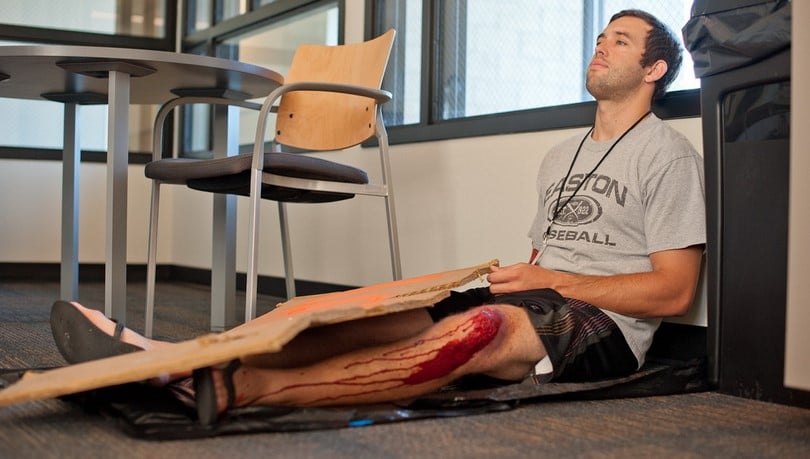
In order to protect you from additional health complications from the ensuing dust try to cover your nose or mouth with any piece of cloth. This is especially important if you have a respiratory illness or allergy like asthma. The last thing that you and your loved ones need is to have to deal with a medical emergency on top of the earthquake complications.
When you are in a vehicle
It can be quite scary to experience the earth move when you are in a vehicle especially out in the open. However, your chances of survival are quite high if you do things right.
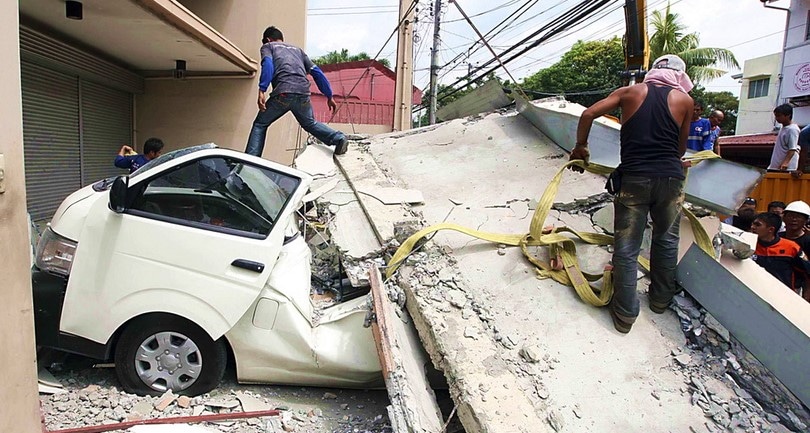
During an earthquake, if you are driving, find the safest spot possible and stop the car. Ensure the spot is away from power and gas lines, under bridges, overpasses and even away from buildings.
The important thing is to minimize disaster in the form of falling objects, possible electrocution, and possible entrapment. Once you stop in the car, just stay in it. Cars are made of metal, which means that they can survive quite a bit of impact. You should also have a bug out bag in your car that can be used when the situation requires it.
However if you are in a multilevel parking lot, the pressure from the building materials will likely overwhelm your vehicle. In such a case, you need to get out of the car, and crouch next to it on the safest side that you can determine. The vehicle will act as a form of shield. Whatever you do, do not venture too far away from the car because it is your best chance of survival.
If you are outside
Having the earth move beneath your feet when you are outside can be even worse than if you were in a vehicle. That said, you are really in a relatively good position.
When you are outside, do not attempt to get into a building. You are unlikely to outrun the earthquake. All it takes is a few seconds of movement and the damage will be done.
If you are in a spot that is far away from bridges, water, trees, power and gas lines, buildings and overpasses, do stay put. If you are not in such a position, find a spot that seems to fulfill at least some of the criteria. Your survival is dependent on you avoiding a possible tsunami, electrocution, dangerous projectiles, and heavy moving objects. Your human body cannot withstand a lot of impact, so bear that in mind.
What to do after an earthquake?
Plenty of people have survived major earthquakes only for them to be injured or killed in the few hours or days afterwards. After an earthquake, you need to worry about the aftershocks. While they are weaker than the quake, they tend to maim or kill because they destroy buildings that were already damaged. That is why you must be very careful of what you do after an earthquake.
Stay put
Even if your first instinct is to run away to somewhere where you will feel safe, do not attempt to do so. If your chosen spot helped you to stay alive, wait for a while. Aftershocks can start just a few minutes after the main quake and may end up hurting or killing you.
First, take time to survey your environment and take notice of the buildings, utility lines, and the like. Once you establish that there is no danger that is when you can move.
Do a headcount
If you and your loved ones were together when the earthquake occurs, you need to start taking stock of where everyone is if you can. Check for injuries and attend to them. That is where your emergency kits will come in handy; remember them?
Evacuate
Once you determine that no major injuries that require emergency treatment are present, you should start evacuation. Be careful as you make your way out of where you took shelter to avoid any more injuries or fatalities. In addition, the strong should help the weak, the kids, and the elderly. Your destination should be the safest place nearby, ideally it should be a bunker. We have a guide on how to build an underground bunker on our website.
Take the emergency supplies if you can, because someone may need them. If you are not sure about what needs to be in your survival kit, you can find more information here. You cannot afford to stay in the building you were in until inspection is done. One aftershock may end up bringing it down upon your heads.
If you are in a car, once you determine that the major danger is over, drive slowly and carefully to a safer destination or your home. Avoid bridges and overpasses. The condition of the infrastructure may be very shaky after the earthquake, which is why you should try to avoid them where possible. Opt for roads that are not built right in the middle of possibly affected buildings if you can.
Damage inspection
Once you have determined that the worst is over, you will need to document the damage that occurred during the earthquake. Be on the lookout for structural damages to your building, because they may cause it to fall. Involve a professional building inspector where possible.
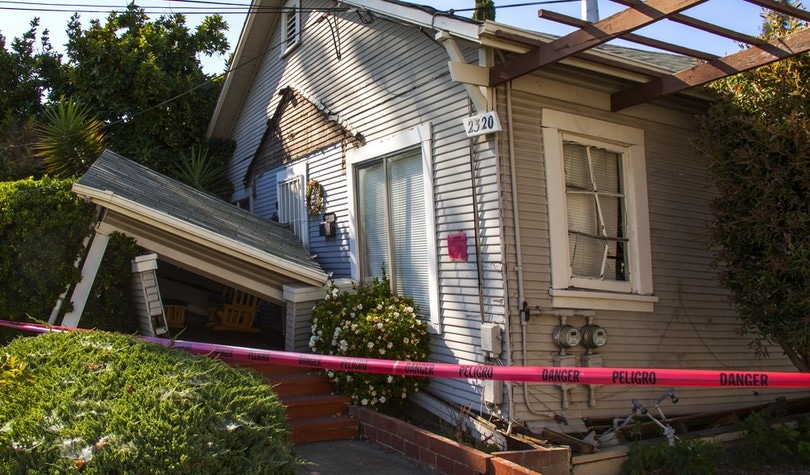
In addition to structural damages, be on the lookout for gas leaks. Open the doors and windows of your home or office if you smell something. However, do not interfere with the power connections. Regardless of whether they are off or on, let them stay that way until it is determined that there is no gas leakage.
The electrical connections should also be checked out. If there is any hint of damaged appliances or wires, call a professional. That way you can ensure that no electrical fires or electrocutions occur. Fire can be ignited simply by moving a switch. You really do not want that kind of problem.
[the_ad_placement id=”in-text-3-type-r”]When the earth moves, everything moves. That is why you should not consume tap water. It may be contaminated. Your emergency water rations will come in handy during a time like that, as you wait for the water utility company to fix things. You should also know how to purify water in case you are stranded in a location where survival teams will take a wile to reach. We also have an article with a list of water purification methods that may come in handy.
Also, if you’re at home and your pluming still works, avoid flushing your toilet as much as possible because the sewer system may have been damaged during the earthquake. Call your plumber and have him check things out first.
The fireplace is another area that can be hazardous to your home and health after an earthquake. You must inspect it for cracks, and possible gas leaks. In such a case, hiring a professional is usually the best way to determine whether you have anything to worry about. A damaged fireplace can cause carbon monoxide poisoning or fire.
Be very careful when you open your cabinets or move furniture around. There may be broken pieces all over the place that can end up injuring you or your loved ones. Try to remove every broken piece object with caution.
Dealing with the long term aftermath
Dealing with the long-term aftermath of earthquakes takes courage. If the damage to your property was severe, you will need to spend time, energy, and money recovering from the event. In the event that you were able to store your important documentation in a fireproof safe, it may be much easier to survive and even thrive.
With your documents in order, you can easily obtain your insurance compensation or financing that you need to begin to build your life again. That too is part of how to survive an earthquake.
Are you really prepared?
While what you do before, during, and after an earthquake is important, the lessons that you learn on how to survive a earthquake are even more so.
Ensure that you learn from your mistakes in preparation for the next earthquake. Doing so may be the best way to enhance your earthquake survival when Mother Nature decides to show her fury again.



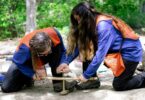


I am very glad that a city where we live in, an earthquake does not happen. We only watch on a TV how many countries and cities are suffered from this natural disaster.
I think that in such areas people should really learn how to survive. I mean children should be taught in a school the basic rules of surviving.
An earthquake can happen anywhere at any given time. In conclusion, it can happen in an area where this phenomena was not registered up until the present time. That’s why is very important for everyone to learn how to survive in such a situation.
Regardless, it is always good to be prepared. You never know when you might need your skills and gear, an earthquake can occur in areas that have never registered the disaster. Mother Nature can be merciless sometimes.
Many families in the United States have no earthquake preparations at all. You need to at least store some food, water, and have a first aid kit for emergencies. During earthquakes the national emergency response system will be overwhelmed and families with no supplies at all will be part of the problem. For your family’s safety you need to learn how to do first aid and treat minor injuries because arrival of ambulances will be delayed. Some other useful tip is when you are in a shopping mall when the earthquake hits, don’t rush to one emergency exit like the rest of the crowd, find another one nearby by walking along the wall.
You can only survive an earthquake if you prepare in advance. Early preparation includes everything that you will need to start afresh in the aftermath.